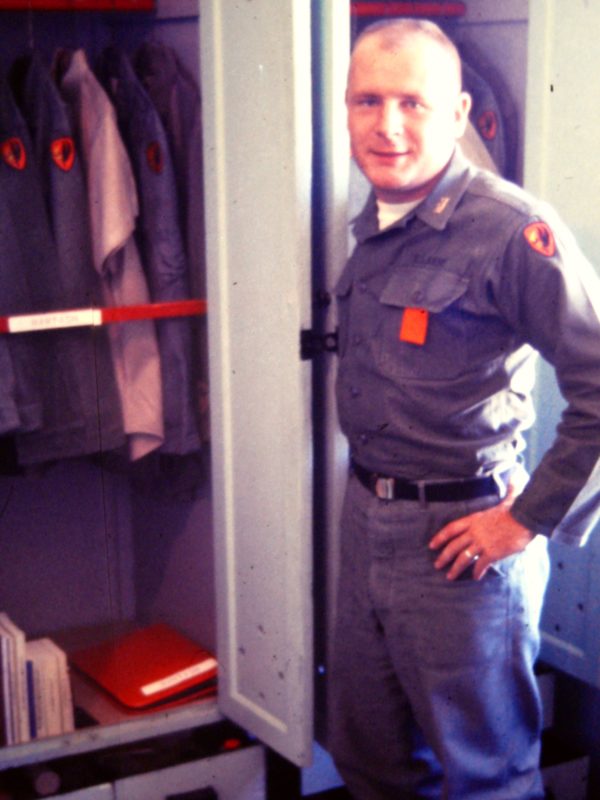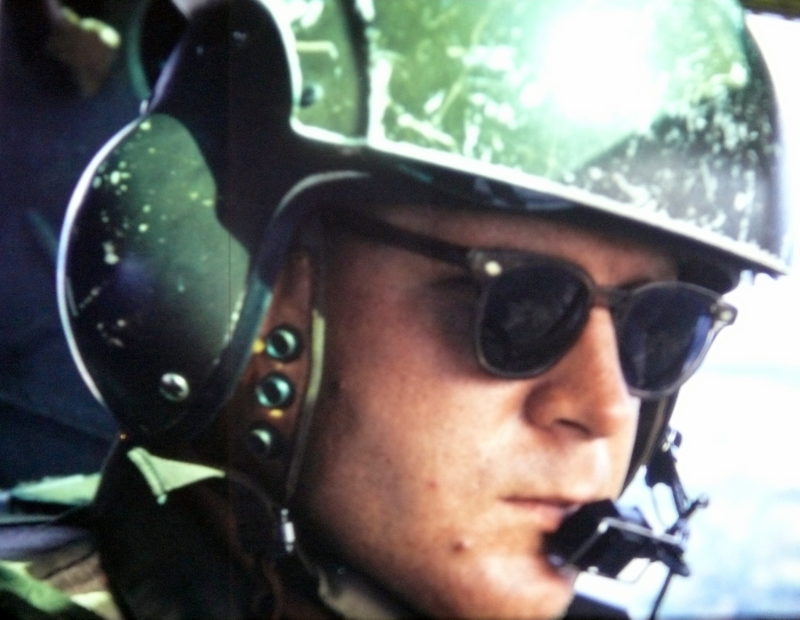After a yearlong tour in Vietnam as a helicopter pilot for the Army, Dennis Bartash came back to the United States to find numerous war protests.
“While I was in the States, people treated us pretty badly,” he said, adding that he quickly volunteered for Cobra helicopter training, so he could return to Vietnam.
And after his second tour was over, he re-enlisted again so he could remain in Vietnam.
“I didn’t want to go back to the States in any way, shape or form,” he said.
This was a sentiment that Bartash carried with him, even after his third tour was cut short just months later.
The Army had too many helicopter pilots, and in 1971, they were releasing them from service, Bartash included. “It tore my heart out.”
He was angry and still wasn’t ready to go back to the U.S., so for years, he did everything in his power to stay abroad.

Early life
Bartash was born Aug. 18, 1943, in New York City to Al and Mildred Bartash, the oldest of seven siblings.
His mother had been part of an all-girl orchestra with her eight sisters before she married his father. His father was in the Army Air Corps and was serving as an instructor at West Point at the time. In 1946, his family moved to Wisconsin.
Bartash was always interested in working, and at age 7, he cleaned shelves in a grocery store near his home. “The owner was amused that I wanted a job.”
At 12, he took on two newspaper routes.
A few years later, his family moved to New Holstein, Wisconsin, where Bartash spent his high school years. While Bartash ran track, he also continued to have part-time jobs, including working at an ice rink in the winter and on a farm in the summer. After graduating, he worked various jobs until a friend invited him to work as a crew member on his sailboat on Lake Michigan.
“While I was sailing, I met an officer from the Edmond Fitzgerald, and I really thought sailing was cool, so I asked him for a job,” Bartash said. “He gave me a letter of intent to hire, so I could get a merchant mariner’s card.”
At the same time, he found out he had been drafted and had a choice — to ship out as a merchant mariner, as they were draft-exempt, or join the Army.
“My father had been in the Army Air Corps in World War II, and my mother said, ‘I want to see you join the Army.’ So I joined the Army,” he said.

Military life
Bartash was sent to Fort Knox, Kentucky, for basic training, “where I was taught the spirit of the bayonet (to kill) and all the combat infantry necessities to say alive,” he said.
Then, he was sent to Fort Ord, California, for advanced infantry training as a mortarman, then to jump school at Fort Benning, Georgia.
After receiving his parachute wings, he went to the 82nd Airborne Division at Fort Bragg, North Carolina. At that time, there were conflicts in the Dominican Republic, so they were training in case they’d have to assist.
“They would have us load weapons (onto a C-130), get on the plane and fly around for a couple of hours,” he said.
They’d then be told they were in the Dominican Republic, so they’d jump out.
“No, we aren’t there, we’re in Fort Bragg,” he said. “So we’d march back. And we did this back and forth.”

While there, he met a pilot who told him he could become a helicopter pilot if he passed a test.
“I didn’t do very well in school,” Bartash said, chuckling. “I was the biggest screw-off in school there was. I think I got my education by osmosis — I didn’t pay any attention; it just sunk in.”
Still, he passed the test and was accepted into Aviation Warrant Officer Candidate School, and signed a four-year commitment.
“In that four years, if I didn’t go to flight school, I would’ve been signed up to jump out of airplanes for four years, so I was really motivated to pass flight school,” he said.

Most graduates were sent to Vietnam, while four, including Bartash, were selected to attend a 13-week aviation maintenance management and test pilot course at Fort Eustis, Virginia, en route to Vietnam.
“When the doors of the plane opened, it was like walking into an oven,” he said, regarding his arrival into Vietnam. “Camp Evans’ wet, red clay was the slipperiest substance I have ever encountered in my life — walking on black ice was a piece of cake compared.”
Bartash was a maintenance officer and a test pilot who ran what they called a direct support unit. “I was knowledgeable about everything on the helicopter.”
After the mechanics would fix the helicopter, Bartash would go reinspect it, then he would take it up and make sure everything was working as it should be.
After his yearlong tour, he volunteered for Cobra helicopter training so he could return to Vietnam.

“Now I’m a Cobra pilot, flying (tactical) missions and supporting the troops,” Bartash said.
He once again re-enlisted so he could remain in Vietnam, avoiding returning to America at all costs.
Several months later, Bartash was given his reduction-in-force notice. “I didn’t know at that time, but I had a really bad case of PTSD, and I was really warped.”
Bartash was honorably discharged after nearly seven years in the service — coincidentally, the same amount his father served — receiving an Air Medal with “V” device for valor, as well as a Bronze Star medal among other medals during his service.

Post-military life
Bartash was still extremely shaken, and did not want to return to America, so he looked up the regulations and found out that he could be released in Vietnam if he acquired a job.
“I bumped into an Australian wing commander at a bar,” he said, adding that the man suggested Bartash join the Royal Australian Air Force.
“I got released from the Army and, on the same day, I get on a C-130 going to Australia,” he said. “They treated me like royalty. I was the first American since World War II to want to join the RAAF.”
When he found out he’d have to go back to school for three years to fly, he decided to return to Vietnam, and his commanding officer was able to line up a position at the U.S. Embassy for him.

“I went to work in Vietnam as a regional liaison officer, collecting intelligence about the war,” Bartash said.
In 1974, after four years on the job, he became disillusioned with the direction of the war and took a leave of absence to go to Iran, where he heard they were hiring helicopter pilots.
When inquiring about a position at Bell Helicopter, which is owned by Textron, he encountered his old flight school instructor, who hired him. Bartash worked as a manager, running the maintenance department, and was able to hire his father.
“Then the revolution started to happen, and things got tough,” he said.
Bell Helicopter flew the Americans and other nationals out of Iran, and Bartash and his wife were on the last evacuation flight.

Bartash still felt he couldn’t return to the U.S., so they got off the plane on a layover in Frankfurt, Germany, returning to Southeast Asia; then Poland, which was a communist country at the time.
While in Poland, Bartash encountered a line of people, which his “American mind” thought was the line for a good movie. He discovered it was a hole-in-the-wall meat market and people were lined up to get their small portion of meat.
“That changed my mind,” he said. “After that, I realized I had fought communism — what I did was right, and I can go back to the States.”
Bartash came back to the United States to find he couldn’t secure a job.
“I had all this management experience, but no college education,” he said. He finally secured a job mixing plastic.
A year later, he got a call from a Textron executive, who offered Bartash a position in Valencia.
He remained there for seven years, until a new guy, “known for cutting the fat in companies,” came in and saw that Bartash didn’t have any education.
“A week later, I was let go, and I went into a deep depression,” he said. “I couldn’t find a job for the longest time.”
Then, finally, his former boss hired him at Esterline, an aviation company, but not long after, due to a restructuring in the company, he again was at risk of losing his job.
“My PTSD rolled in really bad, and I was just beside myself,” Bartash said.
He was able to take another open position, but continued his battle with depression.

In 2015, he was diagnosed with Parkinson’s disease and prostate cancer at the same time, and went into the deepest depression yet, throwing away most of his home videos and photographs.
Since then, he did radiation therapy and went on Parkinson’s medications — “And I’m living with it,” he said.
Now, he’s a facilitator for a depression and bipolar support group in Valencia that he started about two years ago.
“That keeps me going,” he said. “I like to help people, because I’ve been through the wringer and I understand.”
Though his anger kept him abroad for many years, his mind has changed over time. “I studied the Vietnam War intensely, and I learned things that I didn’t know.”
He also realized that those protesting the war had good intentions: “They were young and didn’t know any better,” he said. “Consequently, I’m a totally different person.”













